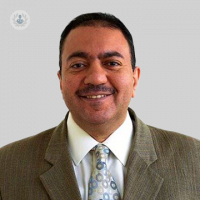Cataracts: symptoms, treatment, and prevention
Written in association with:In this article below, highly esteemed and skilled consultant ophthalmic surgeon, Mr Mohamed El-Ashry, explains what cataracts are, how they are formed, and how they can be managed effectively.

What are cataracts?
Cataracts occur when the eye’s lens becomes cloudy. The lens of our eye, which is normally clear, helps focus light onto the eye’s retina. Vision can become blurry due to the development of cataracts.
What are the main associated symptoms?
There are many symptoms associated with cataracts. The main ones include:
- Blurred or faded colors
- Double vision
- Halos around lights
- Difficulty seeing at night
- Sensitivity to bright lights
What causes the formation of cataracts?
There are many reasons as to why people suffer from cataracts. The main causes and risk factors are as follows:
- Ageing: Most cataracts develop with age.
- Family history: Genetics play a role.
- Diabetes: High blood sugar can impact the lens.
- Eye injury: Trauma increases the risk.
- Medications: Long-term use of corticosteroids.
- Smoking, obesity, and high blood pressure also contribute.
How are cataracts diagnosed?
An comprehensive eye examination is the most accurate and effective way to diagnose cataracts. This test includes:
- Visual acuity test: Evaluates clarity of vision.
- Slit-lamp examination: Microscopic view of eye structures.
- Retinal exam: Detects abnormalities.
- Tonometry: Measures eye pressure.
What are the best treatment options for cataracts?
Cataract surgery is the best option for patients who have developed cataracts. In this surgical intervention, the cloudy lens is replaced with an artificial intraocular lens (IOL). Cataract surgery is highly effective and improves vision significantly in the majority of patients.
What can I do to prevention cataracts?
The following list includes recommendations for patients who are wondering how cataracts can be prevented:
- Regular eye exams: Catch cataracts early.
- Wear correct glasses or contact lenses.
- Use sunglasses outdoors.
- Control blood pressure and blood sugar.
- Maintain a healthy weight.
To book a consultation with Mr Mohamed El-Ashry today, simply head on over to his Top Doctors profile.


